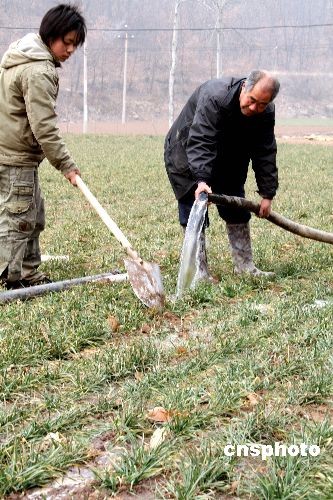|

Farmers in Jiyuan, Henan Province, irrigate wheat on Feb. 5, 2009. China raised the drought emergency class Thursday from level two to level one, the highest alert, in response to the worst drought to hit northern China in half a century.
|
China raised the drought emergency class Thursday from level two to level one, the highest alert, in response to the worst drought to hit northern China in half a century, according to a State Council meeting.
Chinese President Hu Jintao and Premier Wen Jiabao have ordered all-out efforts to combat the severe drought in the country's vast wheat-growing area to ensure a good summer harvest, according to a State Council meeting held Thursday.
Local authorities should make drought relief work their top priority, said Vice Premier Hui Liangyu at the meeting.
Rainfall in most parts of north and central China was 50 to 80 percent less than normal. That has affected 155 million mu (10.33 million hectares) of crops by Feb 5, data released by the Office of State Flood Control and Drought Relief Headquarters said on Thursday.
The rare drought which began in November, has threatened 143 million mu of winter wheat, with 46.35 million mu seriously affected.
Some 4.29 million people and 2.07 million livestock lack proper drinking water, according to the data by the headquarter office.
The central government on Thursday decided to earmark another 300 million yuan (US$44 million) as drought relief fund in additional to 100 million yuan already allocated. The fund will be used to buy agricultural machinery and other production materials.
Government at all levels should give anti-drought work a priority in an effort to stabilize grain production, increase farmers' income and ensure agricultural production, the State Council said.
Relevant departments in local regions were asked to enhance farmland management, mobilize human resources, ensure technology service and enlarge irrigation areas.
Efforts should also go to build emergency water resources projects and carry out artificial precipitation to alleviate water shortage and ensure drinking water for both people and livestock. The Ministry of Water Resources also said it would enhance supervision and launch emergency plan when necessary.
Relevant departments should allocate special funds to aid poverty-stricken people in rural areas.
The Cabinet said it will send working teams to eight drought-hit provinces to discuss anti-drought procedures. The Ministry of Agriculture has already sent 12 working teams of experts to the drought-hit provinces, to instruct farmers on drought relief work.
Plant diseases and pest prevention were discussed and local governments were advised to supervise and prevent the spread of severe animal diseases.
Efforts should also be made to monitor or combat forestry fire, upgrade anti-disaster ability and avoid casualty, the State Council said.